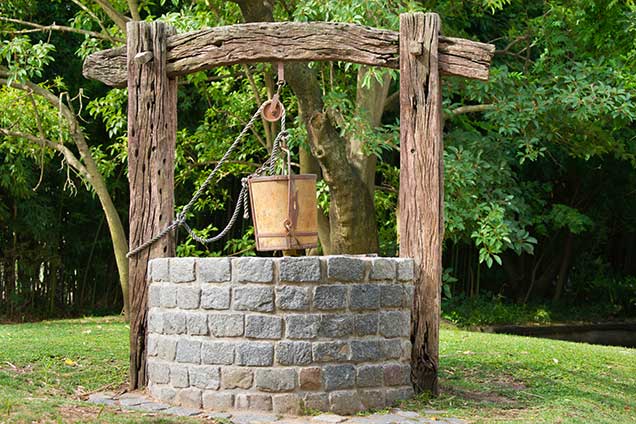Just moved into a home with a private well? Or considering buying a property with an existing well? The below might be of interest to you.
What Is Well Water?
Well water is water supplied by a well. If you’re buying a property with a private well, it means that the property’s water supply – used for drinking, showering, washing clothes, and all the rest – is obtained from a private well. Most homes have access to a public drinking water supply, but private wells are often found in rural homes, where access to public drinking water is limited. Some homeowners may also choose to install a private well to save money on water bills.
Where Does Well Water Come From?
Most well water comes from an underground aquifer. An aquifer is a water-bearing rock, often hundreds of feet beneath the ground’s surface. Wells are drilled down into aquifers and extract the water with a pump.
Testing and Treating Water
Unlike city water, water from private wells is untreated. This means your water may contain higher-than-accepted levels of contaminants deemed by the Environmental Protection Agency or your local health department. To protect your water from harmful contaminants, volatile organic compounds and sediment buildup, you will need to get your water tested annually and treat your water according to the test results.
How to Test Well Water
Wells draw water straight from the ground, so the water is often more contaminated than municipal water. To find out what contaminants your well contains, you will need a water test. We can draw a sample and then forward it to a state certified lab, which can provide a clear report listing all the contaminants present in your water, and their concentrations, usually measured in parts per million (PPM) or milligrams per liter (mg/L).
Well water should get tested at least once a year for lead, arsenic, nitrate, E. coli and coliform bacteria. If your water quality changes in some way – whether by taste, smell, appearance, or anything else – get your water tested as soon as possible
Common Well Water Contaminants
Some of the most common contaminants found in a well water system are:
- Iron, manganese, and hydrogen sulfide – These contaminants are typically safe to drink, but at elevated levels, they affect water quality. Your water may taste metallic or smell like rotten eggs. and may leave orange, brown, or black staining on your water-using appliances.
- Sediment – Large particles of sand, dust, rust, and dirt are commonly found in well water system. These particles are usually harmless but may damage your plumbing and appliances.
- Hardness minerals – Calcium and magnesium minerals, which are responsible for hard water are typically present in high quantities in well water. Hard water is responsible for scale formation, which is incredibly damaging around your home.
- Bacterial contamination – Wells placed near septic systems or farms, or wells with cracked casing, are at risk of bacterial contamination. Bacteria like E.coli can cause gastrointestinal illness when consumed in drinking water.
- Heavy Metals – Arsenic, chromium, lead, selenium and other heavy metals enter private wells from local pollution and from old well components made from metallic materials. Many of these heavy metals – especially lead – are toxic.
How to Treat Well Water
The best way to treat well water is with a whole home water treatment system installed at your water’s point of entry into your home. These water filtration systems are designed to remove common contaminants from a home with a well. They will remove most common well contaminants, such as iron, sulfur, manganese, sediment, and heavy metals. In addition, there are standalone filters, like sediment filters, and systems combining several filtration stages to remove a greater range of impurities. Whatever your needs we are here to help and can find the perfect solution to treat your well water.

